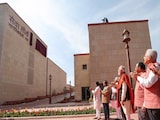The Great Nicobar Project, a visionary endeavour of the Modi government, is poised to transform the Great Nicobar Island into a strategic and economic hub, reinforcing India's stature in the Indo-Pacific. This Rs 75,000-crore mega-infrastructure initiative, a cornerstone of the Act East Policy, harnesses the island's unique geostrategic location to drive national security, economic prosperity, and regional connectivity. While the project promises immense benefits, the Modi government has also prioritised environmental sustainability and the welfare of indigenous tribal communities. In contrast, the Congress party's opposition to this transformative initiative reflects a historical pattern of resisting progress, lacking the foresight to champion bold gamechanger projects.
Strategic and Economic Benefits
The Great Nicobar Project is a multifaceted plan designed to capitalise on the island's proximity to the Malacca Strait, a critical artery for global trade. Its key components - an International Container Transshipment Terminal (ICTT), a greenfield international airport, a modern township, and a 450 MVA gas and solar-based power plant - promise to reshape India's maritime and economic landscape.
The Great Nicobar's location, just 150 km from Indonesia, places it at the crossroads of vital sea lanes. The ICTT at Galathea Bay, capable of handling 16 million TEUs, will position India as a major transshipment hub, reducing dependence on foreign ports such as Colombo and Singapore. This strengthens India's maritime influence, complementing the Indian Navy's INS Baaz airbase to enhance surveillance and counter regional geopolitical challenges, particularly China's expanding presence in the Indian Ocean. By securing control over these critical routes, the project bolsters India's role as a net security provider, safeguarding national interests and global trade flows.
The ICTT will transform the Great Nicobar into a global shipping hub, slashing logistics costs for Indian trade and saving foreign exchange. The greenfield international airport, designed to handle 4,000 passengers per hour by 2050, will serve both civilian and defense needs, connecting the island to mainland India and Southeast Asia. The planned township, accommodating 3-4 lakh people, will foster economic activity through residential, commercial, and institutional developments. Aligned with the Act East Policy, the project will deepen trade and investment ties with ASEAN nations, positioning the Great Nicobar as a gateway for regional commerce and enhancing India's economic competitiveness.
Moreover, the Great Nicobar's pristine beaches, lush rainforests, and rich biodiversity make it a prime destination for ecotourism. The project envisions infrastructure for activities like river cruises, kayaking, and bird watching, drawing visitors while preserving the island's natural allure. Enhanced connectivity via the airport and port will boost local businesses, creating jobs and economic opportunities for residents. Managed by the Andaman and Nicobar Islands Integrated Development Corporation (ANIIDCO), the project ensures that economic benefits reach local communities, transforming the region into a vibrant hub for tourism and trade.
As part of the Holistic Development of Islands programme, the Great Nicobar Project integrates the Andaman and Nicobar Islands into India's strategic and economic framework. By establishing the island as a maritime and tourism hub, it strengthens north-south connectivity, fostering closer ties with Indo-Pacific nations. This aligns with India's ambition to lead in the region, countering geopolitical challenges while promoting economic cooperation. With a 30-year phased implementation, the project reflects a forward-looking commitment to sustainable growth and regional influence.
Safeguarding Environmental Concerns
The Modi government recognises the ecological and cultural significance of the Great Nicobar, home to unique biodiversity and indigenous tribes like the Nicobarese and Shompen. While critics highlight risks of deforestation and tribal displacement, the government has implemented robust measures to ensure sustainable development and protect these communities.
The project secured environmental and forest clearances in 2022, with strict conditions to minimise ecological harm. Compensatory afforestation programs will offset tree felling, preserving the island's biodiversity-rich rainforests. The government has prioritised protecting critical habitats, avoiding turtle nesting sites and coral reefs to safeguard species like leatherback sea turtles, dugongs, and Nicobar macaques. The adoption of gas and solar-based power plants underscores a commitment to cleaner energy, reducing the project's environmental footprint. Collaboration with institutions like the Wildlife Institute of India ensures rigorous biodiversity monitoring, while adherence to Coastal Regulation Zone norms reinforces ecological accountability.
The welfare of the Nicobarese and Shompen, including the particularly vulnerable Shompen living in voluntary isolation, is central to the project's planning. The government has engaged with the Tribal Council of Little and Great Nicobar Islands to address land use concerns, resolving tribal rights under the Forest Rights Act to facilitate sustainable development. ANIIDCO oversees land acquisition and relocation, prioritising community welfare and participation. Rehabilitation plans for the Nicobarese, many displaced by the 2004 tsunami, offer modern amenities while respecting traditional livelihoods. Measures to limit external exposure, protect the Shompen's cultural integrity, ensuring their tribal reserve remains intact. Through consultation and consent, the government aims to empower indigenous communities as stakeholders in the project's success.
The Modi government's approach reflects a commitment to harmonising strategic and economic goals with environmental and social responsibility. The project's phased implementation allows for continuous monitoring, enabling adjustments to address ecological and tribal concerns. By integrating sustainable technologies and fostering inclusive dialogue, the government is crafting a model of development that respects Great Nicobar's unique heritage while unlocking its potential.
Congress's Habitual Opposition
The Congress party, led by its seniormost leaders like Sonia Gandhi and Rahul Gandhi, has criticised the Great Nicobar Project as a threat to the environment and tribal rights. This opposition mirrors a broader pattern of resisting initiatives that propel India forward, revealing a lack of vision and enterprise that has long hindered India's decisive progress.
In the past, the party's tenures have been marked by missed opportunities in critical sectors like semiconductors and manufacturing. While the Modi government's Make in India initiative has attracted global investment and established India as a manufacturing hub, Congress failed to foster industrial growth during its decades in power. Similarly, the India Semiconductor Mission has positioned India as a high-tech leader, an area Congress neglected. The Great Nicobar Project, like these initiatives, demands bold leadership and long-term planning - qualities Congress has consistently lacked.
By demanding an “immediate suspension” of the project without offering constructive solutions, Congress priorities political posturing over national interest. Its resistance echoes past opposition to transformative policies like GST and Defence Manufacturing. The Modi government, in contrast, has demonstrated a commitment to inclusive development, addressing environmental and tribal concerns through proactive measures. Congress's critique ignores the project's strategic and economic imperatives, reflecting a regressive mindset. It needs no reiteration that the Congress party's rule was plagued by delays and indecision in infrastructure development, with projects like the Golden Quadrilateral languishing until accelerated under NDA leadership. The Great Nicobar Project requires the same decisive action that Congress historically failed to deliver.
The Great Nicobar Project is a bold step toward securing India's strategic and economic future in the Indo-Pacific. By transforming the island into a maritime, trade, and tourism hub, it strengthens national security and regional connectivity leading up to South East Asia . As India strides toward global leadership, the Great Nicobar Project embodies the ambition and foresight needed to shape a prosperous, secure, and sustainable future.
(The writer is a national spokesperson of BJP and an author).















